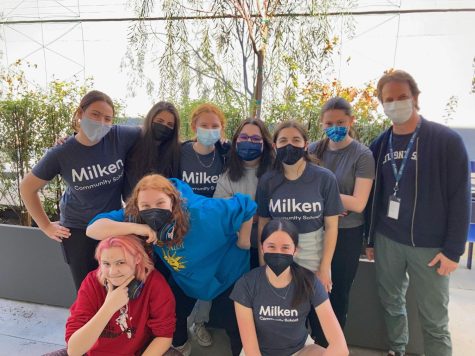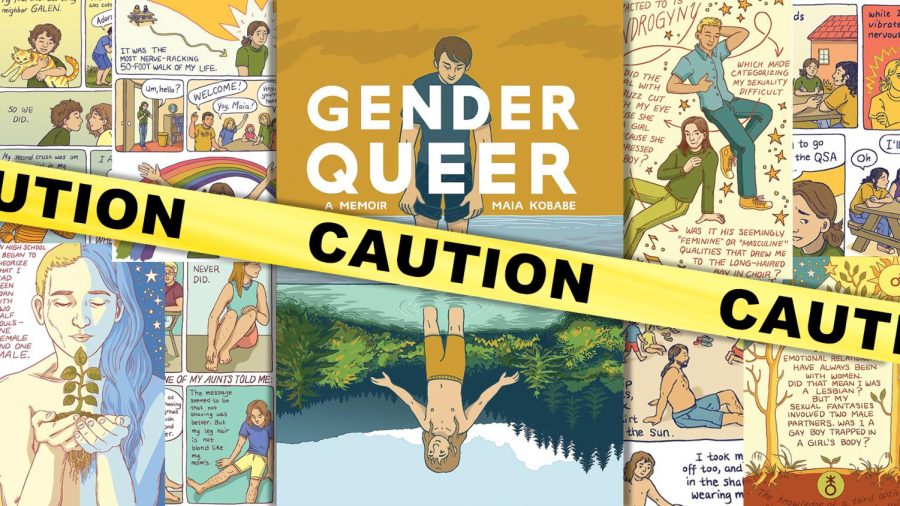‘Gender Queer’: How Milken ‘Marginalized a Marginalized Voice’
Images adapted from “Gender Queer” by Maya Ziv and Spencer Davis
Collage of pages from Maia Kobabe’s, “Gender Queer,” a memoir that centers around Kobabe’s journey navigating eir identity throughout eir adolescence and young adult life as a nonbinary person
On Monday, March 7, Milken’s unofficial Grade 12 Parent WhatsApp group chat was lit ablaze by criticism surrounding two pages from the graphic memoir Gender Queer — one depicting menstruation and the other depicting oral sex. The memoir was being taught in Milken’s 12th grade English course, Marginalized Voices, which introduces new perspectives to students nearing the end of high school. However, many parents believed that Gender Queer was too explicit for the classroom, despite those pages not being included in the required reading assignments for the text.
The following morning, some of those parents began reaching out to Dr. Sarah Shulkind, Milken’s Head of School, voicing their concerns about the quality of the literature, and the subjects and perspectives covered in the memoir. In an email to 12th-grade parents that same day, Dr. Shulkind and Dr. Kimberly Schwartz announced that they had suspended the required reading assignments for the memoir due to parent concerns about “illustrations of sexual health and sexuality,” effectively removing it from the class curriculum. The administrators claimed that Gender Queer was not approved through Milken’s curricular approval process, though many teachers say that they were unaware of this procedure.
Following the decision, members of the Milken community were divided — some pleased with the removal, and others questioning the administration’s true intentions. Many in Milken’s LGBTQ+ community felt that the removal established a dangerous precedent that prioritizes the desires of parents over the protection of LGBTQ+ voices on campus. “Sometimes it feels revealing,” Eden Hirsch ‘23 explained. “This is where your true intentions lie. You do not care about the academic well-being of your students, you do not care about the actual mental health of your students, you care about the reputation you have among parents. It hurts my feelings.”
Emerging from the pandemic, parents across the country have taken a renewed interest in the content that their children are being taught in schools. As a result, national book-banning efforts have hit a 20-year peak according to the American Library Association (ALA), mainly targeting Black and LGBTQ+ voices. Of the top ten most challenged books in 2021, half were challenged for including LGBTQ+ content.
In 2021, Gender Queer became the most challenged book in the United States, according to the ALA. Written by Maia Kobabe, who uses e/em/eirs pronouns, Gender Queer centers around Kobabe’s journey navigating eir identity throughout eir adolescence and young adult life as a nonbinary person. The memoir walks readers through eir struggles being accepted in a society that is accustomed to the gender-binary world, and how that translates to eir own experiences of self-acceptance.
This made Gender Queer the perfect fit for the Marginalized Voices class. When reexamining the content of Marginalized Voices last summer, the administration and English department agreed that the course was lacking in expansive representation of the LGBTQ+ community, though it already contained a unit on LGBTQ+ issues.
Tasked with expanding that section of the curriculum for the college-prep level of the course, Ms. Sophie Frank, an English teacher new to the school, selected Gender Queer because she felt it aligned with the essential questions and overall goals of the Marginalized Voices class.
The course was first created over a decade ago by combining content from seminars on women’s and African American literature in an effort to “expose students to life experiences and life realities different from what they know,” as Mr. Adam Steele, one of the creators of the course, explained. In the decade since its creation, teachers of the class have integrated more representations of marginalized voices into the curriculum, including those of the LGBTQ+ community.
“A lot of the best literature and the best representation of marginalized voices is more modern, and always evolving,” Dr. Schwartz explained, so the teachers are constantly incorporating new forms of media into the curriculum — whether that be a music video or a work of slam poetry.
As a modern representation of an LGBTQ+ perspective, Gender Queer fit the bill. Though graphic novels are often overlooked in the classroom, Ms. Frank selected the memoir to help develop students’ visual analysis skills. In addition, Ms. Frank thought that students could discuss why Gender Queer was so widely restricted in different communities, in line with their in-class conversations around cancel culture and censorship.
When teaching the novel This Is How You Lose Her, for example, Ms. Frank contextualizes their readings around how the author, Junot Díaz, has been accused of sexual misconduct. Together, the class analyzes whether these allegations should shape students’ interpretations of the text, especially when the book contains graphic descriptions of sex.
Ms. Frank planned to expand on this same conversation with Gender Queer, examining why this perspective received nationwide backlash and “whose job it is to decide whose voices should be heard.” However, these conversations were cut short.
Just a few days into the unit, the unofficial Grade 12 Parent WhatsApp group chat began buzzing with conversations about the memoir. A parent voiced their concern and sent two images from Gender Queer — one depicting oral sex and the other depicting menstruation. These pages were not included in the required reading assignments for the memoir.
Immediately, other parents responded with a variety of perspectives. For some, Gender Queer was seen as low-quality literature because of its graphic medium. Others took issue with the memoir’s themes of gender and sexuality. Some parents explained that they value education regarding gender and sexuality, but they believed that Gender Queer was too explicit for the classroom.
The following morning, some parents voiced their concerns in emails to Dr. Shulkind and various members of the Board of Trustees. However, Dr. Schwartz, the Chief Curriculum & Program Officer, and other administrators were unfamiliar with the memoir and its presence in the class due to a misstep in the curricular approval process.
For a book to be properly approved, it must be added to the MBS bookstore prior to summer break, where Dr. Schwartz normally reviews materials for administrative approval. She consults resources that specialize in approving books for young audiences, such as Common Sense Media and the School Library Journal — both of which deem Gender Queer appropriate for teenage audiences. By doing so, Dr. Schwartz is able to directly respond to parent concerns regarding curriculum, as she is familiar with the texts and understands their suitability in the classroom.
However, since administrators decided to add another LGBTQ+ perspective to the Marginalized Voices curriculum over the summer, Ms. Frank never had the opportunity to upload Gender Queer to the MBS Bookstore. Instead, she obtained approval from the English Instructional Leader, Mr. Thomas Moran, and added it to the class syllabus at the beginning of the school year.
In retrospect, Dr. Schwartz realizes that this new step in the approval process “wasn’t super clear” to teachers. Often, teachers add books to their curricula during the year based on their relevance to the course and the pace of the class, only obtaining approval from their instructional leader and never adding them to the MBS Bookstore.
When administrators first heard of the parent concern surrounding Gender Queer, Dr. Schwartz explained that they were “really playing catchup with something that was spinning out of control and out of context across our community.”
So, they started to investigate. They first approached Ms. Frank and Mr. Moran that day, who could “articulate why they had chosen this book and… why they thought they had done their due diligence” in terms of approving the book, according to Dr. Schwartz. At that meeting, Ms. Frank spoke about how she could potentially pivot the conversation in class to address concerns.
However, the situation continued to spin out of control. Over the course of the day, parents spread the screenshotted pages to other group chats and continued to email administrators with their concerns.
Despite meeting with Ms. Frank and Mr. Moran to gain insight, administrators believed that they couldn’t properly respond to the growing outrage or salvage conversations surrounding the memoir outside of the class. “We felt like we needed to take action quickly to bring clarity,” Mr. Beau Lindsay, the 11/12 Division Head, explained. So, by the end of the day, administrators decided to remove Gender Queer from the required reading material for the course. Dr. Shulkind and Dr. Schwartz sent an official email communication to 12th-grade parents announcing their decision.
In that email, the administrators clarified that the book was not properly approved, and apologized for assigning it as required reading. “We care deeply about your children, and we strive to fulfill our core values in all we do,” the email concluded.
However, many felt that the removal of Gender Queer did not uphold Milken’s core values. “It sends mixed messages,” Ilana Frid-Madden ‘23, a co-leader of the Genders and Sexualities Alliance (GSA), elaborated. By removing a memoir that directly correlates to LGBTQ+ education, “it sends the LGBTQ+ community here further into hiding.”

On campus, students say they experience incidents of homophobia. When speaking about LGBTQ+ identities in the classroom, Eden Hirsch ‘23 explained that there is “widespread derision and disgust from my classmates.” Ms. Alexandra Sandoval, Milken’s 9th-grade Health teacher, noted that she often receives pushback when teaching about gender in her Health class.
Separately, when the topic of pansexuality came up during a class lecture, “a couple of students started audibly fake gagging,” according to Hirsch. “It just kind of shocked me to treat things you don’t understand with that much hate,” they continued.
However, this was not an isolated occurrence. “I know a couple of [Milken] kids who have called me f****t to my face,” Hirsch explained, though they noted that those experiences never occurred on campus.
Ms. Frank and Mr. Ari Karpel, both of whom identify as LGBTQ+, are concerned for LGBTQ+ students at Milken. “I have attended and worked at schools on both coasts of the US, in Europe, and in Israel, and this is the most homophobic environment that I have been a part of,” Ms. Frank stated.
Still, eleventh-grader Hirsch doesn’t believe that intolerant people represent the majority of students. “They’re just the loudest, and there’s enough people enabling them, and that makes them even louder.”
When administrators removed Gender Queer from the class curriculum, LGBTQ+ students and faculty spoke out. Representatives of the GSA and their faculty advisor, Mr. Karpel, met with Dr. Shulkind to discuss steps forward for LGBTQ+ representation on Milken’s campus.
Following the meeting, LGBTQ+ high school students conducted a panel discussion at the middle school and plan to continue these conversations through monthly Oneg sessions on the middle school campus.
“I think this can be a homophobic place,” Mr. Karpel stated. However, he is working to change that, in part by establishing an LGBTQ+ faculty/staff affinity group. He is also working with Dr. Lisa Acker, the Head of Student Services, and Ms. Sirida Terk, who will serve as the Coordinator of Diversity and Inclusion next year, to establish avenues for transgender and nonbinary students to change their pronouns at school.
Parents also spoke out and expressed support for Gender Queer and its place in the classroom. “When a community or school is open to discussing these issues, it makes [students] feel more accepted,” Lailee Foroutan, a 12th-grade parent, explained.
“This book should be read to open the eyes of our community,” Gabrielle Baker, another 12th-grade parent, said.
Other parents are concerned that Milken is getting caught up in the larger trend of book challenges. “I hope Milken doesn’t get wrapped up in this kind of frenzy too,” Julie Hermelin stated.
Others continued to criticize the memoir. Some parents were concerned that the depictions of menstruation were too explicit for the classroom. To that point, Ms. Sandoval, Milken’s Health educator, explained that menstruation is a regular part of life for half the population. “There is nothing gross, there is nothing dirty, and nothing bad about periods, and I don’t think that periods are graphic,” she said.
Other parents took issue with the graphic depictions of oral sex, equating them to pornography. Some students, however, disagreed. Eden Hirsch ‘23 believes that traditional literature is more explicit than the images in Gender Queer because they are depicted in a “very cartoony, very blocky [style] with barely any shading.”
Parents who voiced criticism of the memoir did not respond to The Roar’s request for comment.
Emerging from the pandemic, Dr. Schwartz thinks that parents may need to shift the ways that they utilize their WhatsApp chats. Now, as there are more opportunities for in-person communication between parents and administrators, she hopes that feedback can go directly to her and other administrators before circulating among other parents.
At Milken, administrators believe that parents are partners in their child’s education. “In the same way that we give parents feedback about their kid’s progress and their learning and their behavior,” Dr. Schwartz said, “I think it’s absolutely appropriate for parents to give feedback in return.”
Typically, when discussing complex issues like gender and sexuality, administrators give advance notice to parents. However, since they were unfamiliar with Gender Queer until the controversy, they were unable to do so. “I wish we had done better pre-communication,” Mr. Lindsay added.
For many, this controversy was revealing of the need for the Marginalized Voices class, as the course has worked to broaden the perspectives of Milken students before they leave high school. “It gives [students] an opportunity in a structured setting with a teacher to think through issues of race, of gender, of inclusion in literature in a way that fosters growth and allows for productive conversations,” Ms. Frank explained.
According to Ms. Frank, much of Milken’s English curriculum had previously centered around the voices of those in societally privileged positions, specifically “white men, many of whom are no longer alive,” leaving students with an expansive knowledge of classic literature, but a limited understanding of more diverse and underrepresented backgrounds.
With this in mind, the Marginalized Voices course has served as a “corrective to that traditional curricular history,” as Mr. Karpel, the teacher of Honors Marginalized Voices and the faculty adviser for The Roar, explained.
In essence, the goal of Marginalized Voices is to destigmatize marginalized topics and expose students to these unfamiliar perspectives. Removing Gender Queer directly restricted that goal for LGBTQ+ identities. “In general, removing books from a curriculum stunts education,” Ari Hoffman ‘23, a co-leader of the GSA, explained. “It literally cuts a topic short [and] restricts access to knowledge.”
“It is equal in comparison to a lot of the stuff that I’ve been forced to read in a lot of my other classes,” Eden Hirsch ‘23 explained, “except for the fact that it is gay sex being depicted instead of heterosexual sex.” When reading This Is How You Lose Her, students in the Marginalized Voices class encounter graphic portrayals of heterosexual sex. To Hirsch, it seems the outrage only stems from LGBTQ+ depictions of sex.
Ilana Frid-Madden ‘23 said that the removal of the book “has the effect of re-stigmatizing LGBTQ+ topics, and bringing it back to something that is not only taboo, but something to be ashamed of.” Though she doesn’t believe that Gender Queer should be placed back into the curriculum, Frid-Madden worries about the effects of its removal. Some LGBTQ+ students in the GSA noted an increase in homophobic and transphobic comments and an increase in the use of slurs around campus after the book’s removal.
“There’s a really tragic irony in marginalizing a marginalized voice within the class,” Dr. Schwartz said. “That isn’t an intended consequence but I recognize that it is a consequence.”

Maya Ziv is a senior at Milken and the Co-Editor-in-Chief of The Roar. After finishing the show, Unorthodox, Maya found that she had nobody to talk about...

As a senior at Milken, Spencer Davis is in his third year writing for The Roar and his second year as the Co-Editor-in-Chief. Spencer joined Journalism...

Ayla Kattler is a current senior at Milken and Roar enthusiast. Ayla has always had many opinions (some people say too many) and she is excited to share...

Alexa Dardashty is a senior, and Co-Editor-in-Chief of the Roar here at Milken. She is also the Social Media Manager. Alexa also loves her maltese, Bruno....





Rona Cohen • Jun 20, 2022 at 11:17 am
I am so happy that Milken is finally embracing the LGBTQ community. Nice to know that there is a school in Los Angeles will accept these kids as part of the Jewish community. Bravo Milken!!!